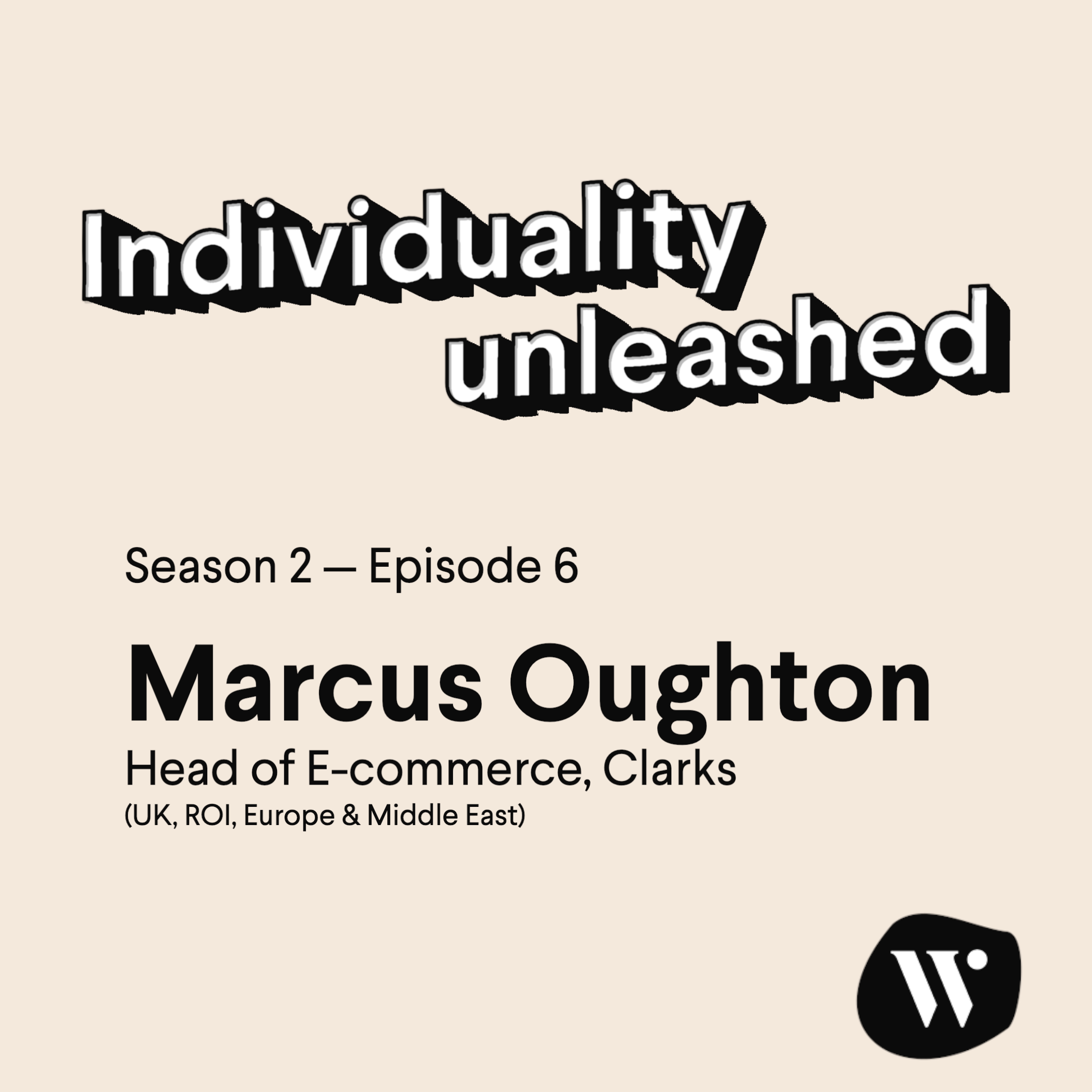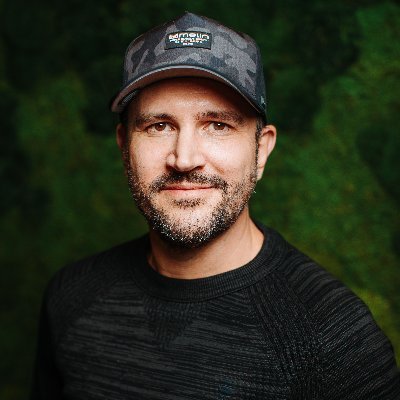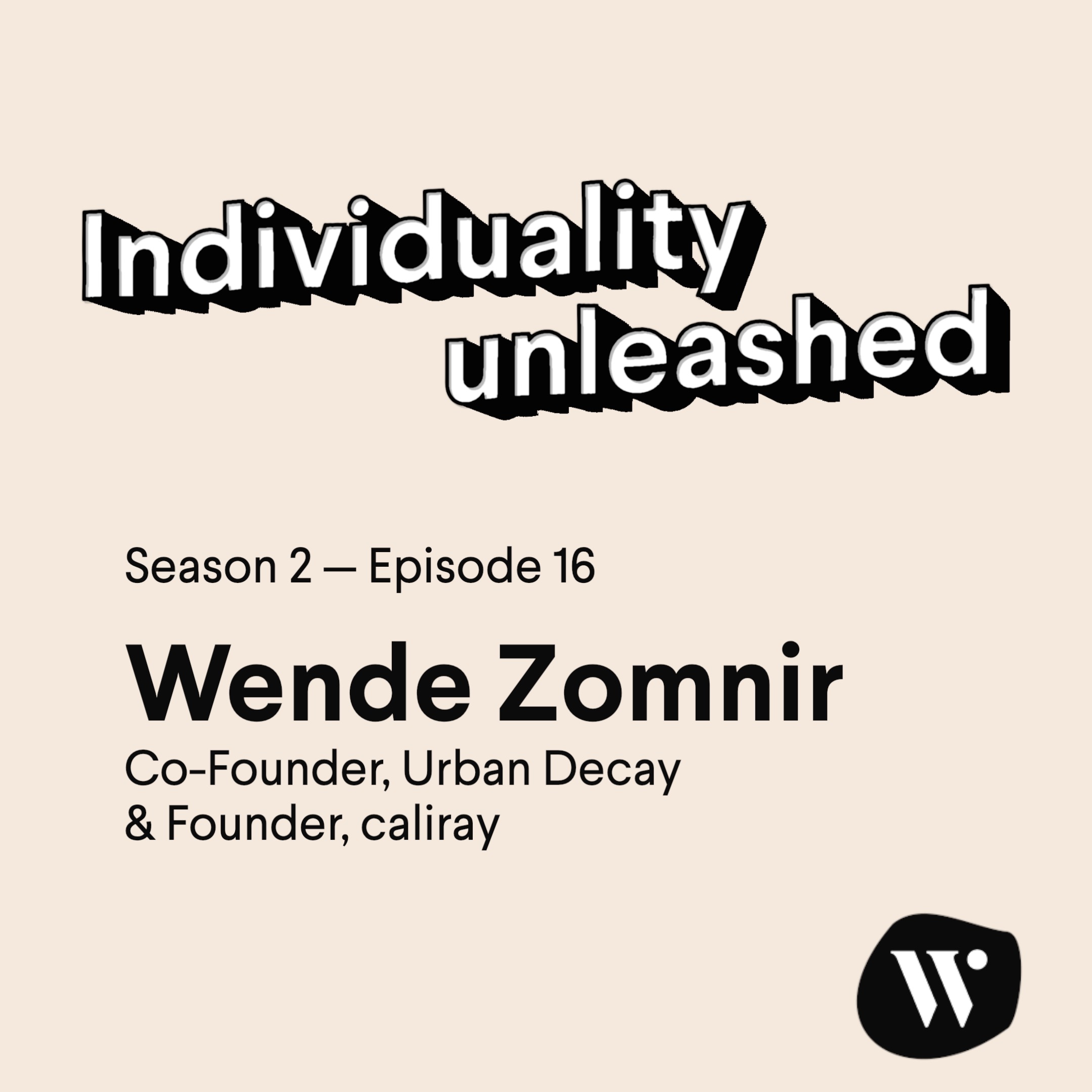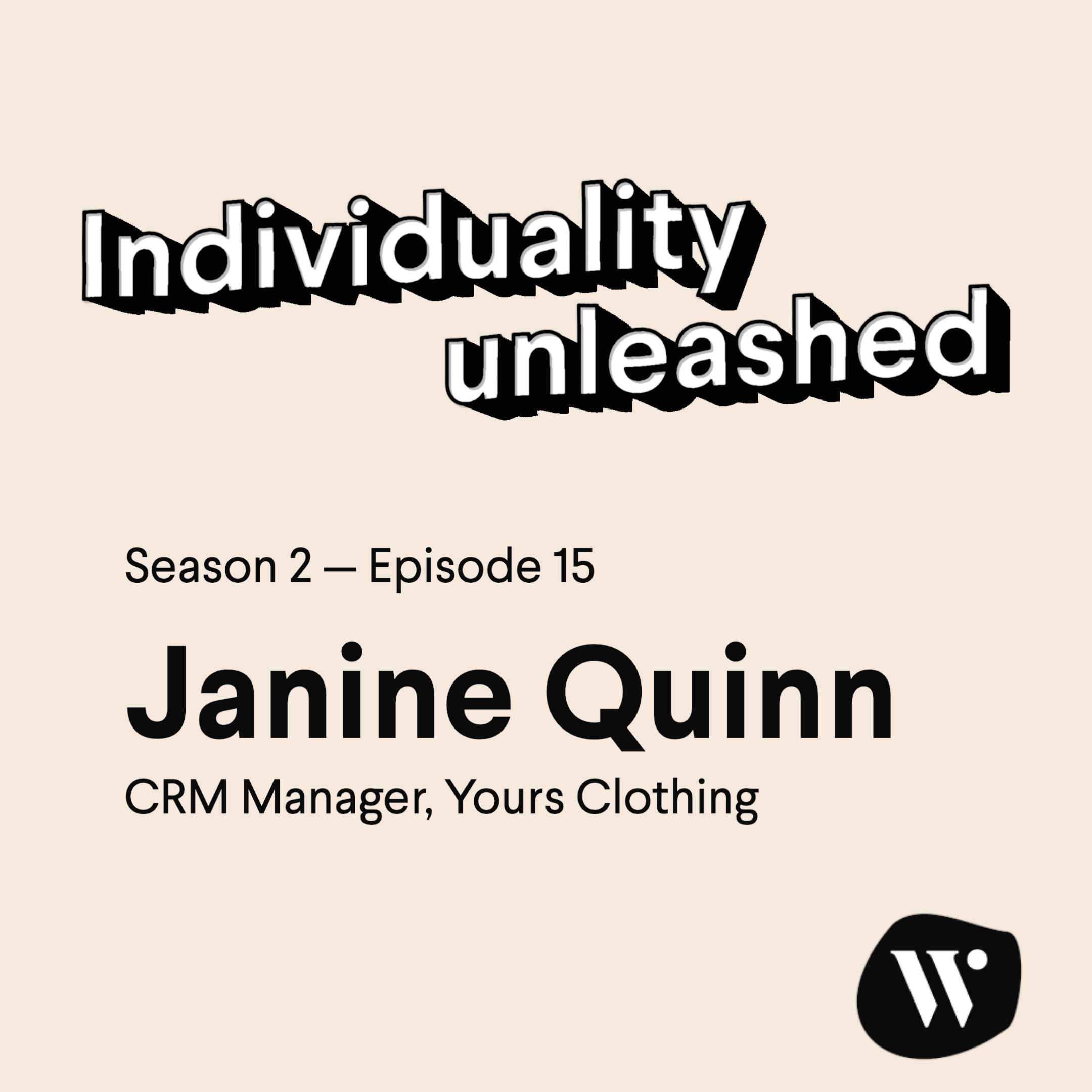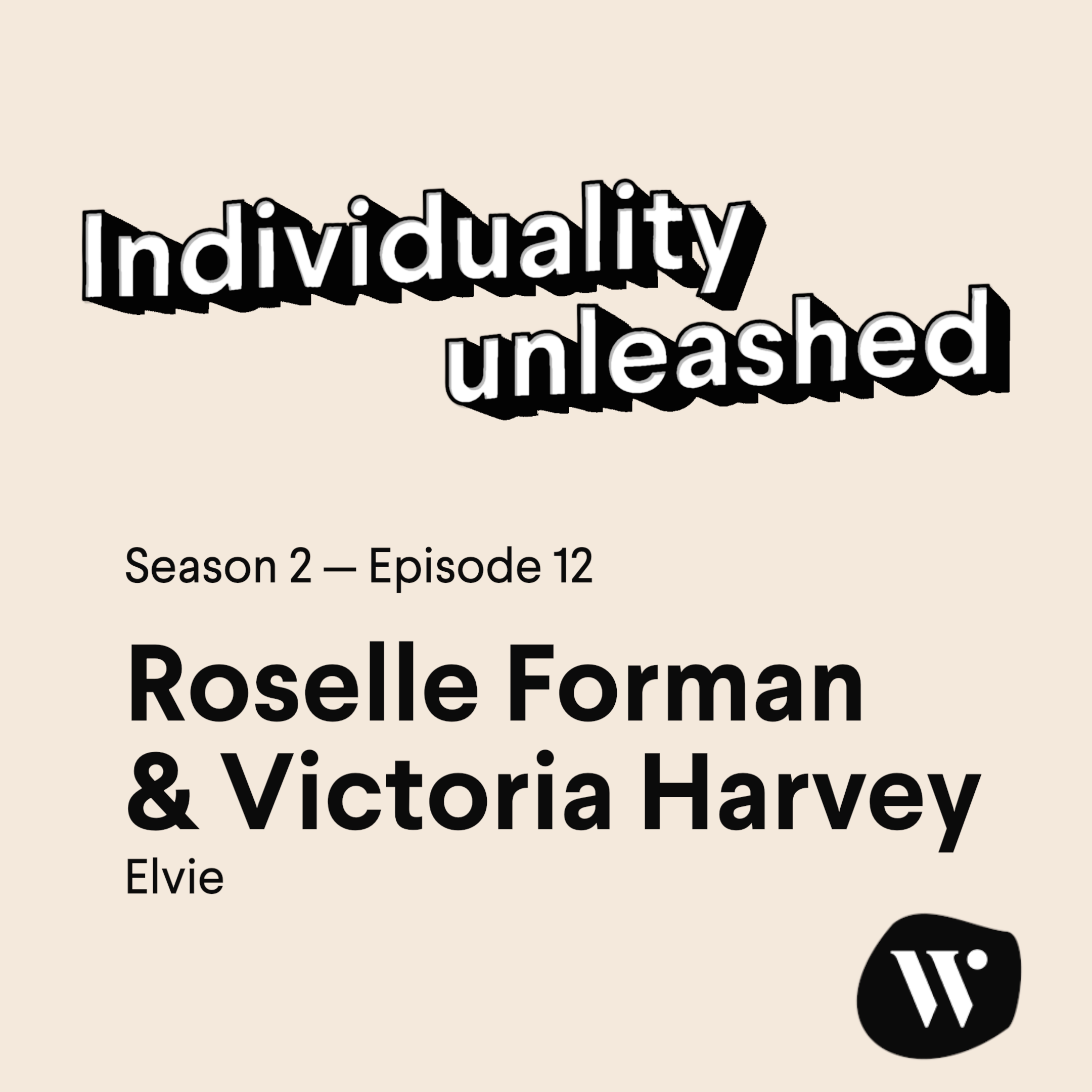Essential Elements to Building an E-Commerce Team with Marcus Oughton, Clarks
- 0.5
- 1
- 1.25
- 1.5
- 1.75
- 2
Cian Agnew: Hello, and welcome to the latest episode of Individuality Unleashed. My name is Cian Agnew, and I'm joined here in this interesting suite in London by the Head of E- Commerce for UK and EMEA at Clarks, Mr. Marcus Oughton. Nice to see you, Marcus.
Marcus Oughton: Thank you.
Cian Agnew: How you doing?
Marcus Oughton: Very, very good. Thank you for the very polite introduction.
Cian Agnew: I'm a polite man.
Marcus Oughton: I know you are, but thank you.
Cian Agnew: I have to make sure that I maintain that reputation, especially given this is being filmed.
Marcus Oughton: Good man.
Cian Agnew: But thank you very much for joining us here today.
Marcus Oughton: Thank you. Thanks for the invitation.
Cian Agnew: And giving us your time, I know it's valuable. Thank you very much. We want to kick things off by talking a little bit about how you achieved the success that you've seen at Clarks over the years, specifically with regards to your team. What do you think are the essential elements of building a successful e- commerce team?
Marcus Oughton: Good question, good question. I think, for me, it's going to be unique to every brand, it's going to be unique to the individual leader, but there's couple of things really probably stand out for me. E- commerce has almost reinvented itself as a function within a business. I think the big thing for me is that teams need to have a really, really crystal- clear focus on the commercials of the business. Arguably, we're an operational function, but actually there's a commercial element that really, really needs to go through the entire team. I think there's also a bit around a phrase I quite often use, which is going to sound super intelligent, but, diversity of thought. For me, what I try to instill in the team is that no idea is a bad idea. You get the idea, but just to think differently. We've got a very unique customer profile at Clarks and I think that having a team that can think differently and really drive out that innovative sense of moving things forward is quite important.
Cian Agnew: When you're building your team, do you look for candidates and potential members of that team who do think differently? And if so, how do you go to market looking for those?
Marcus Oughton: Another good question. Another good question, Cian.
Cian Agnew: You should have known what you were getting yourself in for when you sat down.
Marcus Oughton: How do we look for that? I think it's difficult, isn't it? Because you see a CV, you get the screening questions and then you get the interview. I think it's just more about, does the person have a rooted passion for the brand? People that I've interviewed recently have got a genuine passion for the brand, and I think that's just super, super important.
Cian Agnew: You look at their shoes when they walk in?
Marcus Oughton: Absolutely. Absolutely. And make sure the label has been taken off as well. But I think it's about just trying to understand, what is their motivation for joining the brand? And I think that's a big thing. Their interest in the product, the interest in where we are going. And it's more about, for me, it's about the attitude of that individual. Can you get a sense through the conversation that this person is really going to be someone who is going to strive to outperform, real can- do attitude, super agile in their approach to thinking. We're trading a number of websites, we're really trying to drive this brand forward, so someone who is just really, really open to wanting to work at Clarks.
Cian Agnew: Nice. And that's a good tip there for anybody who is watching here that Marcus is going to interview one day, make sure that you're turning up in a pair of Clarks shoes-
Marcus Oughton: Top tip.
Cian Agnew: ...otherwise you're out the door. How would you say that you've broken any silos that have affected the efficiency of your marketing team, and therefore that might filter up into the overall business inaudible?
Marcus Oughton: He's full of good questions today. But maybe that's the idea, right? That's the idea.
Cian Agnew: I'm like David Frost.
Marcus Oughton: It's the idea.
Cian Agnew: The David Frost of e- commerce.
Marcus Oughton: What was the question? Silos?
Cian Agnew: Yeah. How do you break down those silos that might affect the efficiency of the marketing?
Marcus Oughton: I've got to be honest, I haven't really, in the last few years, experienced obvious silos in the teams that I've worked in. I think what you can do to ensure those silos aren't created is just ensure that everybody is on the same page. Which sounds like a bit of a cliche, but that's everything from understanding the division, understanding the role they play, what are their objectives?
Cian Agnew: Well, this goes back to what you were saying about ensuring that everybody is conscious of the overarching commercials that sit at the top and how their role fits into that.
Marcus Oughton: Absolutely. And ensuring you take them on the journey. For me, it doesn't matter whether you're talking to your team, your peers, you're talking to the C- suite, you just need to bring people on the journey. But the key thing for me is to ensure silos don't emerge, is to make sure everyone's involved at the same point. If it is a new idea, get everybody involved at the beginning. Which sounds obvious, but I've worked in places where that doesn't happen and that can quite quickly create rafts within the organization.
Cian Agnew: That's interesting. You have worked at places where these challenges perhaps haven't been met as effectively as you've been able to meet them?
Marcus Oughton: Yeah, I think so. And I think it's down to, I don't know, really, the legacy of certain brands, how long someone's been a particular organization, are they maybe not as forward- thinking as other parts of the business?
Cian Agnew: Very, very interesting.
Marcus Oughton: Thank you.
Cian Agnew: Thank you.
Marcus Oughton: We're not going to get into that, are we? Thank you. Thank you.
Cian Agnew: No, no.
Marcus Oughton: We'll do that at the end.
Cian Agnew: At the end of every question we'll have a little thank you session, and then we'll move on to the next one. Let's move on to channels. What marketing channels do you think will dominate e- commerce in the coming years? There is definitely a bit of a shift, of course. People are moving away from traditional acquisition channels and trying to diversify a bit. What, in your view, if you were looking into your crystal ball, what do you think is coming?
Marcus Oughton: Do you want me to get it out my bag?
Cian Agnew: Oh, that's great that you brought it, actually. That's very handy.
Marcus Oughton: That's a joke, I don't have a crystal ball. But if I did, that would be quite handy, wouldn't it?
Cian Agnew: That would be very useful.
Marcus Oughton: I'd find this question super easy to answer. I think for me, get the basics right. Don't be afraid of admitting that you still use the standard search channels, you still use an affiliate network. Don't be afraid of admitting that that is potentially still where a lot of the revenue's coming from. The big thing for me is the constant thinking and challenge and innovation around what is new. But equally, don't just try everything that's new, have a really considered approach. In terms of channels that are really emerging. I think for Clark's where we are striving to really protect and foster our existing customers, but then also attract new customers to the brand. We are looking constantly at, what are the trends in terms of where are our new customers active? No surprise that social, live- streaming and channels that have more of an interaction are going to be of super interest to us. I think particularly from an overarching brand perspective, we have got to become more relevant and more obvious in the market. Dare I coin a phrase, the marketing textbook of upper funnel, there needs to be a consideration there. I don't think there's a straightforward answer for, what are the future marketing channels? I think it depends where you are as a brand today, where you want to get to, and being super clear where your target market is.
Cian Agnew: Is it using some of those traditional acquisition channels, but also some of the ones that have emerged over the course of the past couple of years, as a brand awareness tool, in an effort to try and drive more traffic to the top of the funnel? And then having a bit more of an elaborate mid- funnel strategy for trying to convert them?
Marcus Oughton: Yeah, I think it is back to the point we were talking about around objectives. It's making sure that your channel mix delivers on a number of objectives. Performance marketing, let's say, five years ago was all about cost per acquisition, the last click, getting that sale in. Whereas, I think brands that take a bit more of a holistic look at performance marketing to perform a number of functions, be that pure acquisition, or maybe some form of engagement, let's talk about email and things like that, then that's really where you should be looking.
Cian Agnew: You mentioned existing customers earlier on as well, so that's the brand awareness piece. With the existing customer base, given there's a kind of erosion in returns at the top of the funnel, in general, the marketers are seeing at the moment, do you have more of a focus on existing customers and encouraging people back for their second, third purchase? Is that more at the fore now than it used to be when it was all about getting as much new traffic into the top of the funnel as possible?
Marcus Oughton: Yeah, I think it's both. I think it's both, but I think there's an objective around existing customers. It's not just about frequency of communication, it's the relevancy, so there's a big piece there. But I think it's both. Because we've got quite a few objectives as a business, like I said, to foster or protect the core, but also to attract the new. I think it's, yes, a combination of both.
Cian Agnew: Interesting. Very, very interesting. Thank you.
Marcus Oughton: Thank you.
Cian Agnew: We're going to thank each other after every question-
Marcus Oughton: Great, great.
Marcus Oughton: Was
Marcus Oughton: that one question?
Cian Agnew: That was a question-
Marcus Oughton: Wow.
Cian Agnew: ...with, I think, two or three sub questions-
Marcus Oughton: Okay.
Cian Agnew: ... underneath them. The CFOand the finance team in general are having more of a say with budget allocation than they used to this year as everyone's battening down the hatches and getting ready for some stormy seas. How would you say, in your experience, what is the most effective way that a finance team and a marketing team can work together to ensure that marketing budget is utilized effectively and efficiently?
Marcus Oughton: Great. I think you've answered the question, by working together. I think that was...
Cian Agnew: Right. Good. Done.
Marcus Oughton: Do you want me to elaborate on that?
Cian Agnew: Done.
Marcus Oughton: Done. Thank you.
Cian Agnew: Yes, thank you.
Marcus Oughton: Who's interviewing who here, right?
Cian Agnew: I've accidentally turned the tables.
Marcus Oughton: Let me elaborate. I think, joking aside, it is about working together. It is about fostering this culture of collaboration. But back to my very point around, how do you build successful teams? If you have an e- commerce team that is super astute from a commercial perspective, then they're going to have an appreciation of the investment, they're going to have an appreciation of the return, and that won't just be reserved to finance. And I think that's the big thing here is that, again, if you involve everyone at the beginning and you are super clear on what everyone needs to see from the business, for everything we do from a marketing perspective, there will be a marketing and a brand outcome. There will be a financial outcome. I don't think it's about, okay, let's involve finance at the very beginning because we need some cash and let's involve finance at the end because we need to tell them how much this cash has given us in terms of revenue. Everyone is part of that journey, which again sounds like a bit of a cliche, but it's true and it works. And one of the things we do regularly is we have these performance reviews. We have these business reviews where we will sit around and it will be marketing, it will be finance, it will be e- com. We sit around and we review and we analyze. And I think also as well, there's the subsequent appreciation from the finance community of what is being done by the commercial teams, by e- commerce, by marketing.
Cian Agnew: Do you ever find that there's a misalignment between the finance teams who perhaps would want to focus more on efficient, profitable revenue versus commercial teams who might want to just focus on the flattering top line revenue growth? Or do they have more of a hand in hand view of what is success?
Marcus Oughton: Another good question.
Cian Agnew: Mate, I'm full of good questions.
Marcus Oughton: Another good question. Simple answer is that it goes back to my point around objectives and as an e- com team we are aware and consider all the performance metrics. It is about, what is the generation of site visits, what's the generation in terms of the six or seven stages through the conversion funnel, how does that then look in terms of ROAS? In my tenure at Clarks I've not ever come across a situation where there's a differing view of what success and what good looks like, but that's because we've set ourselves up in a way and we act in a way where we are all in at that at the beginning.
Cian Agnew: It's like looking at how all of those KPIs and metrics are baked into any top line goals and then ultimately when you're evaluating performance-
Marcus Oughton: Absolutely.
Cian Agnew: ...you look at it in the same way?
Marcus Oughton: Absolutely.
Cian Agnew: How would you say you best collaborate with finance teams to identify new growth opportunities?
Marcus Oughton: Wow, that is a good question.
Cian Agnew: I'm like six for six now.
Marcus Oughton: Okay. I feel like I'm saying the same thing, the same answer to every question.
Cian Agnew: Collaboration.
Marcus Oughton: No, no. I think it is...
Cian Agnew: That's the thing though, that's the thing. If it's about collaboration and ensuring there's no silos, then...
Marcus Oughton: Again, we have a number of forums and we work with third parties where we are effectively presented to in terms of what is up and coming. And it is about the audience, it's making sure that everyone is there that needs to be there. If you've got a presentation on the latest, innovative MarTech that's out there, don't just bring along the marketing community, see if your finance business partner is able to come along. Is there representatives from the retail store teams? For me it's about, without patronizing clearly, educating, making sure. And it works both ways. It works both ways in terms of the only way we can build up our commercial acumen is being very close to the finance community and learning and being interested in what key objectives they have.
Cian Agnew: I don't know if this is putting you on the spot a little bit?
Marcus Oughton: Probably.
Cian Agnew: But as a big finale.
Marcus Oughton: Drum roll. Do I need to do a drum roll?
Cian Agnew: Yeah, if you could.
Marcus Oughton: I will.
Cian Agnew: Did you bring a drum?
Marcus Oughton: I didn't, no.
Cian Agnew: Can you think of an example of where there has been a conflict between something that perhaps a marketing team has wanted to do and a finance team has wanted to see, and how you've resolved a conflict of that nature to try and ensure that all parties are collaborating in the way that you described today.
Marcus Oughton: Can I say I haven't.
Cian Agnew: Okay, you haven't. All right, cool. Fair enough.
Marcus Oughton: Honestly, I can't think of an example. I think the only thing I will say is that there is always, in every business where there's the merging of marketing, IT, finance, it's about the prioritization. I think that's the key thing. I think the only conflict, which is very similar across a number of businesses, in my experience, is the prioritization. It is super difficult to prioritize, and then once you have prioritized, it's super difficult to stay prioritized because there might be things that come in that sound super interesting. And I think it's just really about understanding what would cause a conflict and just making sure it doesn't happen. And I think it is just about staying focused, staying super focused, admitting that you just can't do everything and working through it together.
Cian Agnew: It sounds like Clarks is one big happy family of collaboration-
Marcus Oughton: Absolutely. Absolutely.
Cian Agnew: ...and everyone's pointing in the right direction.
Marcus Oughton: Absolutely. We are. I think, joking aside, it is and has been a really, really exciting couple of years. Like most retailers we've come through the pandemic and it is a super exciting time for the brand and really, really excited for the future.
Cian Agnew: Well, I asked you up top, what were the secrets to your success? And it sounds like that that's it. Collaboration.
Marcus Oughton: Brilliant.
Cian Agnew: Making sure everybody's on the same page.
Marcus Oughton: Well done.
Cian Agnew: Everybody's metrics are accounted for, so there you go. You heard it here first.
Marcus Oughton: Great.
Cian Agnew: Marcus, thank you very much-
Marcus Oughton: Thank you.
Cian Agnew: ...for joining us, for your time today.
Marcus Oughton: Thank you for the invitation.
Cian Agnew: No problem.
Marcus Oughton: Thank you.
Cian Agnew: Let's go have a pint.
Marcus Oughton: Absolutely.
DESCRIPTION
Subscribe to Wunderkind's YouTube channel: https://www.youtube.com/@bewunderkind
Follow Wunderkind:
LinkedIn: https://www.linkedin.com/company/bewunderkind/
Instagram: https://www.instagram.com/bewunderkind
Facebook: https://www.facebook.com/BeWunderkind/
Twitter: https://twitter.com/wunderkind
More from Wunderkind: https://www.wunderkind.co/resources/
Wunderkind is a performance marketing channel that delivers one-to-one messages across email and text at an unmatched scale.

